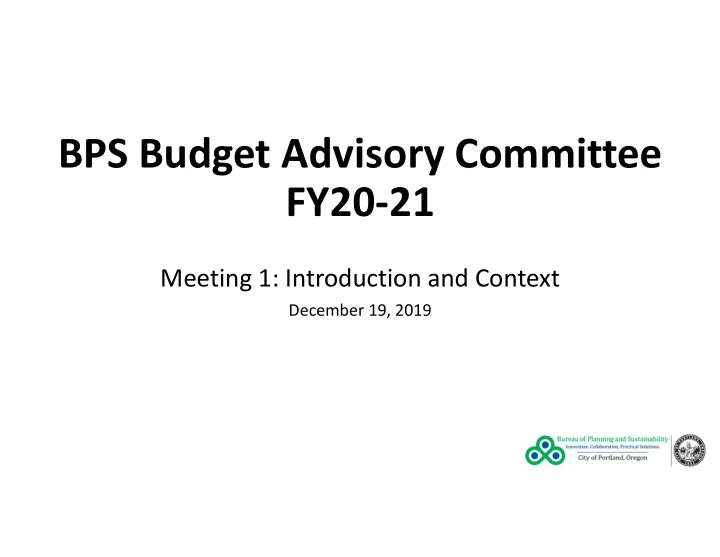

BPS Budget Advisory Committee FY20 ‐ 21 Meeting 1: Introduction and Context December 19, 2019
Agenda • Introductions • Budget Process • Mayor’s direction • BAC role • Funding overview • Program Offers Overview • Next steps
BPS Ground Rules 1. Listen to understand, not to respond. 2. W.A.I.T . [“Why Am I Talking?”] 3. Assume good intentions, but attend to impact. 4. Be willing to make mistakes and be forgiving of those who do. 5. Allow for, and appreciate, disagreement of opinions, ideas, methods – respectfully. 6. Personal stories stay, lessons can be shared. 7. Meeting ‐ specific (if requested). _______________ (Fill in the blank.) This can be used for a meeting ‐ or team ‐ specific item should the group want to include one or more additional Ground Rules.
Introductions • Name • Pronouns • A word that describes you using the first letter of your first name
Mayor’s Budget Guidance FY20 ‐ 21 • Bureaus to work collaboratively with other bureaus in related service areas to identify long ‐ term multi ‐ bureau programmatic and operational efficiencies. • Priority Issue Areas: • Leadership Action on Climate Change (BPS, PBOT, PBEM, PP&R, PFR, OMF) • Community Development Mitigating Displacement (BPS, PHB, PBOT, Prosper) • Homeless Crisis • Collective Public Safety Budget • Parks Financial Sustainability • Ratepayer Affordability • Long ‐ Term Liabilities
Mayor’s Budget Guidance (cont.) • All new funding requests should be paired with a proposal to offset at least 50% of the proposed cost by either: a. Leveraging existing resources. b. A reduction package proposed individually or in partnership with other bureaus. • Requests for new resources should demonstrate meaningful progress towards achieving approved Council and bureau strategic plans. • Requests that are co ‐ sponsored by other bureaus and which are in alignment with the above priority areas will be more favorably regarded.
Roles & Purpose of BAC • Understand the BPS work program, priorities and funding sources. • Share community perspectives, particularly the needs and priorities of historically under ‐ represented communities. • Inform and advise on how BPS prioritizes its discretionary resources to achieve desired community outcomes.
BPS Mission BPS takes action to shape the future of Portland and advance climate protection for a more prosperous, healthy, equitable and resilient city now and for future generations.
BPS Values
Citywide General Fund Revenue (in (in millio illions) Intergovernmental, Beginning Fund 5% Balance, 4% Lodging Taxes, 5% Service Charges & Other, 6% Property Taxes, 39% Transfers from Other Funds, 10% Utility License Fees, 13% Business Licenses, 18% 1 0
Where does General Fund go? (in millions) Transportation & Public Utilities Reserves & Parking Elected Officials 0% Transfers 2% 3% 5% BPS is part of “Community Community Development” together Development Public Safety 9% with Civic Life, BDS and BHR 56% Parks, Recreation & Culture 13% City Support Services 12% 1 1
FY19 ‐ 20 Funding Sources ($22M total) General Fund One ‐ Time $800k Grants & Contracts $1.8M Solid Waste Management Fees $7.5M Portland Clean Energy Fund $2.2M IAs & Other $800k General Fund Ongoing $8.9M
BPS FTE Distribution by Funding Type 140.00 120.00 100.00 80.00 60.00 40.00 20.00 ‐ FY08 ‐ 09 FY09 ‐ 10 FY10 ‐ 11 FY11 ‐ 12 FY12 ‐ 13 FY13 ‐ 14 FY14 ‐ 15 FY15 ‐ 16 FY16 ‐ 17 FY17 ‐ 18 FY18 ‐ 19 FY19 ‐ 20 GF on ‐ going & overhead GF one ‐ time IGA & IA Grants PCEF SWMF
BPS Program Offers for FY20 ‐ 21 • Comprehensive & Strategic Planning • Code Development • Area Planning • Environmental & River Planning • Smart Cities • Climate, Energy & Sustainable Development • Waste Collection • Sustainability Engagement • Portland Clean Energy Fund • Bureau Administration
Performance Measures • A primary focus of the program offers is communicating the quantifiable outcomes to Council and the public via performance measures. Over the long ‐ term, the goal is that each program should be associated with multiple measures, including at least one outcome measure and one output or efficiency measure. • Based on workload, output, efficiency, outcome. • What did we accomplish? • How efficiently did we accomplish it? • What impact did our accomplishments have on the community?
Next Steps BAC Meeting #2: Thursday, January 9 (4 ‐ 6 p.m.) • Program Offers q&a • Equity in Program Offers • Budget Equity Tool • BAC input to letter to Council
Recommend
More recommend